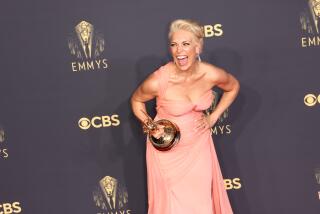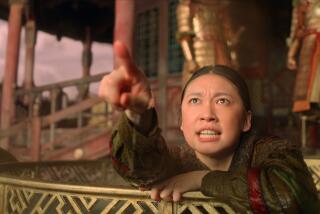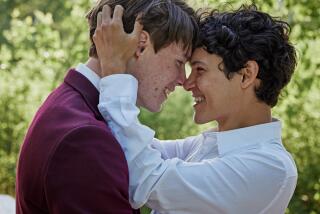How the ‘Game of Thrones’ finale reminds us of the 2020 presidential race
If the last couple of election cycles have taught us anything, it’s that the road to the White House is paved with more town hall meetings than any one human with a functioning soul should ever be forced to watch.
If the last eight seasons of “Game of Thrones” have taught us anything, it’s that the American electorate pays much closer attention when the battle between candidates involves medieval weaponry, man-eating hounds and winged dragons who flame empires.
Sunday’s “Game of Thrones” series finale promised to reveal the victor of the struggle for the Iron Throne, and 19.3 million viewers tuned in to see a new leader crowned or watch all the show’s remaining survivors slaughter one another. Either way, it would be the last few moments in a fantasy land where outdated voting machines and Russian meddling have no bearing on who wins.
FULL COVERAGE: The final season of ‘Game of Thrones’ »
But alas, Daenerys Targaryen (Emilia Clarke) didn’t ascend on her dragon amid glorious beams of divine light in one final breathtaking victory, and Arya (Maisie Williams) didn’t wear the face of her “brother” Jon Snow (Kit Harington) and steal his birthright in one last stunning, deceptive twist.
The reveal happened during what can only be described as another damn town hall meeting.
VIPs from the Seven Kingdoms, many of whom we haven’t seen in years (and at least one Dornish ruler we’ve never seen), assembled to pick a new monarch in the wake of Queen Dany’s demise. She turned tyrannical before she ever had the chance to govern the realm, and was murdered for the greater good by her lover and nephew, Snow.
The meeting wasn’t totally CNN fodder: They met in a dragon pit. At least one participant threatened to cut another’s throat. Leather was worn by all.
But the tone was familiar, even to those of us just starting to pay attention to the ever-growing field of 2020 presidential candidates: “My lords and ladies, I suppose this is the most important moment of our lives. What we decide today will reverberate through the annals of history,” said out-of-the-blue candidate Edmure Tully (Tobias Menzies) — last seen capitulating to Jaime Lannister in Season 6 — as he rose from his seat to suggest himself as ruler. “I stand before you as one of the senior [leaders] in the country, a veteran of two wars. I’d like to think my experience has led to some small skill in statecraft and —”
“Uncle,” interrupted an exasperated Sansa. “Please sit.”
If only we could import her to the real world for the next 1,000 years’ worth of campaign speeches leading up to the 2020 election.
Imagine her encounter with Massachusetts congressman Seth Moulton, the 19th Democratic candidate to enter the presidential race, a Harvard man and Iraq war veteran who tried and failed to oust Nancy Pelosi from running the House: “Seth, please sit.”
At least the “Game of Thrones” writers room had a sense of humor about their king-making process, and the current debate about the state of our own democracy.
ALSO: How ‘Game of Thrones’ wronged its female characters in the series finale »
Sam Tarly (John Bradley) suggested that maybe the lords and ladies shouldn’t be the only ones making the call because they weren’t the only ones subjected to the king’s rule. “Maybe the decision of what’s best for everyone should be left to, well, everyone,” he said. His words describing democracy hundreds of years too soon appeared to inspire a thoughtful silence until the council members erupted into peals of laughter at the absurdity of such an idea.
“Maybe we should give the dogs a vote as well!” roared one.
“I’ll ask my horse,” cried another.
Bernie Sanders’ Medicare-for-all plan would have been an easier sell.
Like democracy, “Game of Thrones” women also weren’t viewed as a viable option. Almost all of them slogged through some of the show’s most dehumanizing journeys — arranged marriages, rape, abuse and servitude — before fighting their way out, making them the strongest contenders for a new kind of leadership. But they weren’t even discussed in the end.
Break the wheel, Dany had argued, and boot all the corrupt families and immoral men from the power positions they’ve held for generations. Burn it down, so to speak, and replace it with a just world. Too bad the show’s creators wrote her into crazytown, and weaponized her crusade with dragon fire. She ended up the living embodiment of every female villain, from the evil queen to the crazy ex-girlfriend to the women murderers featured in the true crime series “Snapped.”
ALSO: Who won ‘Game of Thrones’? From first to last, Peter Dinklage »
In the end, the show’s articulate and persuasive Tyrion Lannister (Peter Dinklage) argued for the least inspiring choice, and the mostly male council agreed.
The empire was awarded to one of the least-qualified men for the job — Bran Stark (Isaac Hempstead Wright), a.k.a. Bran the Broken — a candidate who did little to nothing to get where he was (where was his vision power when the Night King’s army was slaughtering all those people at Winterfell?), and who was quite literally carried around on the backs of women for years. No magic. Just a privileged son of elites who sat back and let others do the heavy lifting.
It’s questionable how Bran, the keeper of history who turned out to be about as effective as Amazon’s Alexa when it comes to answering inquiries with relevant information, became preferable to the Breaker of Chains, the Night King slayer, the woman who brought down the Boltons and freed the North, and the commander of the Iron Islands.
Sorry Dany, Arya, Sansa (Sophie Turner) and Yara Greyjoy (Gemma Whelan). The electorate is just not ready for you yet, even in make-believe land.
The ladies instead can busy themselves like fierce warrior-turned-lovesick diarist Brienne of Tarth (Gwendoline Christie), chronicling the amazing stories of men for future male leaders.
Or they could just create their own story, where town hall meetings, and the closed-minded men who run them, are the stuff of ancient history.
More to Read
The complete guide to home viewing
Get Screen Gab for everything about the TV shows and streaming movies everyone’s talking about.
You may occasionally receive promotional content from the Los Angeles Times.







